Saudi Arabia's King Salman marks year of change
- Published
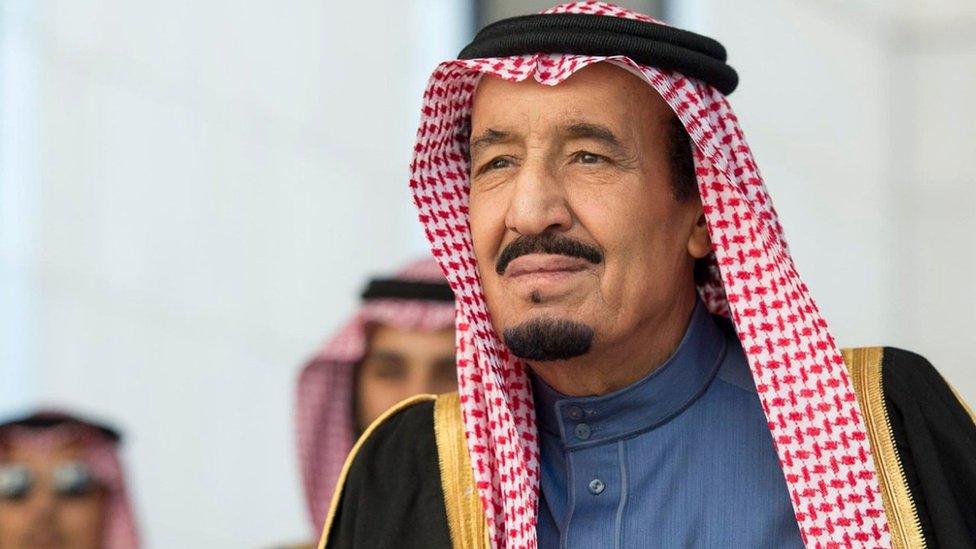
King Salman was assumed to be someone unlikely to "rock the boat" when he took power
Wars in Yemen and Syria, a deadly stampede at the Hajj, mass executions, bombings in mosques, and plunging oil prices - King Salman's first year on the throne in Saudi Arabia has been anything but quiet. So how has he fared and what challenges does his country now face?
When King Abdullah died a year ago and was succeeded by his half-brother, Salman bin Abdulaziz, many predicted there would be little change in policy.
Salman was nearly 80 years old and had spent 48 years of his life as governor of Riyadh, overseeing its transformation from a provincial desert town to the plate-glass metropolis it is today.
A renowned conservative, Salman was assumed to be someone unlikely to want to "rock the boat". That assessment has turned out to be wrong.
Power politics
In a shock to the old order, the new King Salman quickly appointed his favourite son, Prince Mohammed bin Salman, as both defence minister and deputy crown prince. He was 29.
While his youth brings the leadership more into line with Saudi Arabia's overwhelmingly young population (70% of Saudi citizens are aged under 30), the prince's inexperience has inevitably raised questions about his qualifications for such a crucial post.
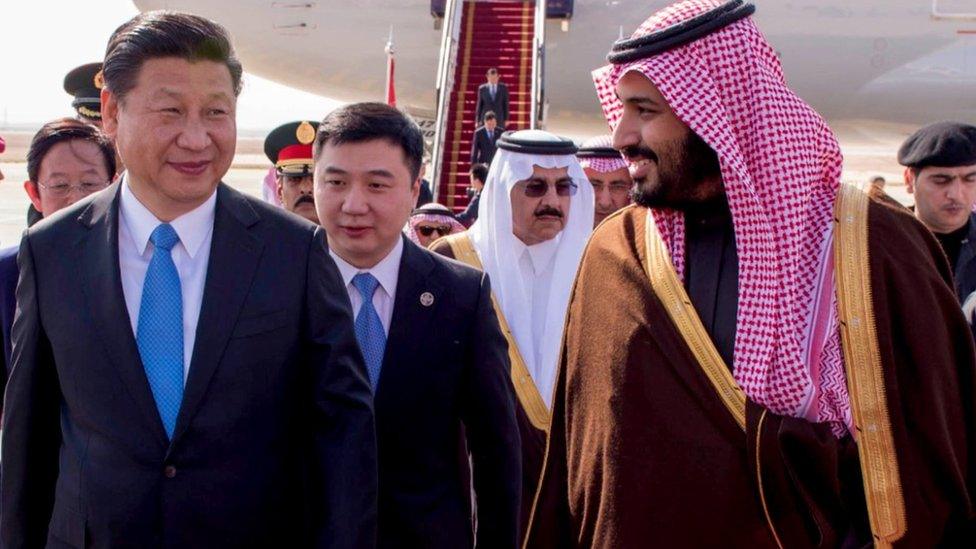
Prince Mohammed bin Salman (right) is seen as the power behind the throne
When I met him in Jeddah in 2013, few Saudis I spoke to knew anything about him.
Today, he is rarely out of the news, having become the front man for the leadership's new and assertive (some would say "aggressive") foreign policy, as well as taking over the economic reins.
His meteoric rise to power has prompted rumbles of unrest amongst certain wings of the enormous Saud royal family, leading to speculation in Western media outlets about a potential palace coup.
"People criticise the messenger," says Robert Lacey, the British historian who has written a number of acclaimed books on the House of Saud, "but if you look at the assertive hard line being exercised by Prince Mohammed bin Salman - in Yemen or Syria, or the oil price, or in domestic energy pricing - those are all policy choices that are pure Salman: an older man's decisions being put into effect with a younger man's abrasiveness."
Stalemate in Yemen
Two months into Salman's reign, Saudi Arabia led a 10-nation coalition into a highly controversial war in Yemen that continues to this day.
This marked a dramatic break with the country's hitherto reserved and non-confrontational foreign policy but it reflected a new assertiveness at the top.
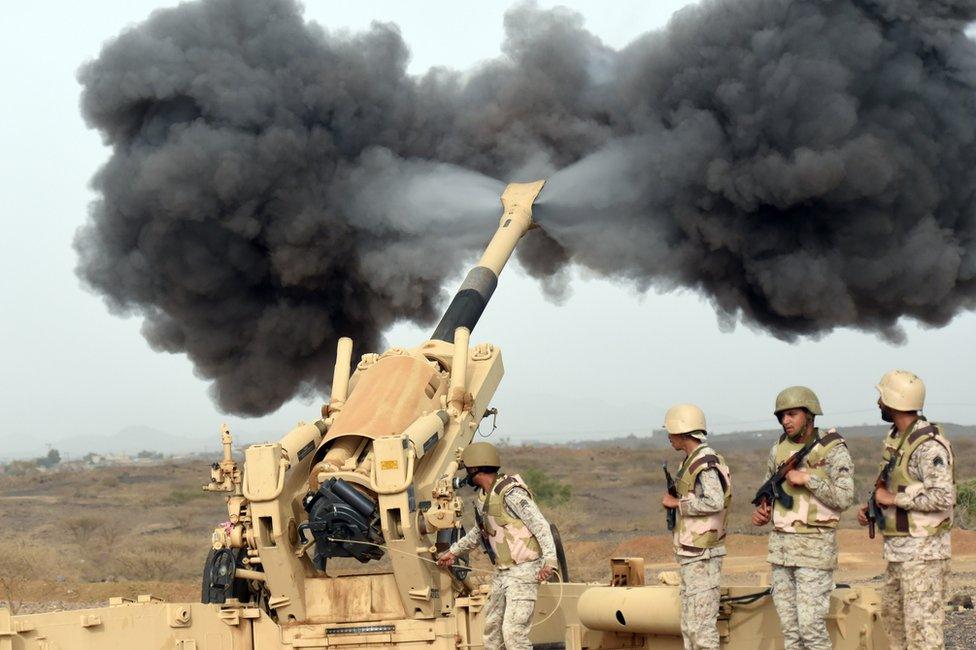
A Saudi-led multinational coalition is battling Houthi rebels in Yemen
In the wake of the Arab Spring and a growing Iranian influence across much of the Arab world, Saudi Arabia has felt increasingly threatened and surrounded.
Suspecting that the takeover of half of Yemen by the Houthi rebel movement was really an Iranian ploy to establish a client state on Saudi Arabia's southern borders, the Saudis launched a blitzkrieg of air strikes, hoping to bomb the Houthis back to the negotiating table.
When I met the Saudis' chief military spokesman in Riyadh in April, he was confident the Houthis would soon be defeated and the pro-Saudi President Abdrabbuh Mansour Hadi restored to power. Yet 10 months later, neither has happened.
The Saudis and their Emirati allies are bogged down in a stagnant war with no clear victors.
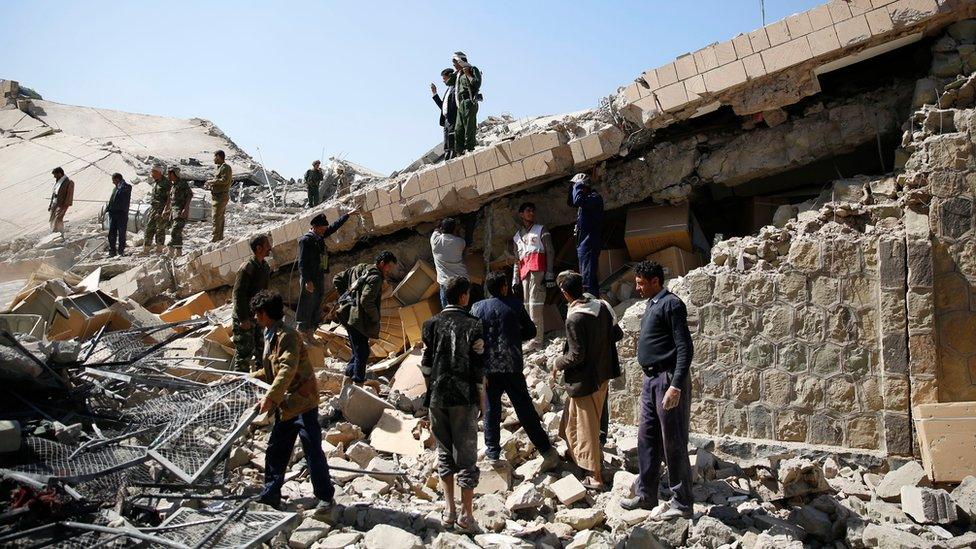
Almost 6,000 people have been killed in nine months of air strikes and fighting on the ground
The Houthis remain in control of the capital Sana'a and much of the north, while the Emiratis run Aden. Jihadists, including al-Qaeda, have profited from the confusion to consolidate their hold on much of the east of the country.
Meanwhile, almost 6,000 people are estimated to have been killed, almost half of those being civilians, and the war is costing the Saudi treasury billions of riyals.
Without a clear victory over the Houthis, the Yemen war could well become a liability for both King Salman and his son, the defence minister.
Syria peace talks
From the outset of the uprising against Syria's President Bashar al-Assad in 2011, Saudi Arabia made it clear it backed the rebels and wanted Mr Assad gone.
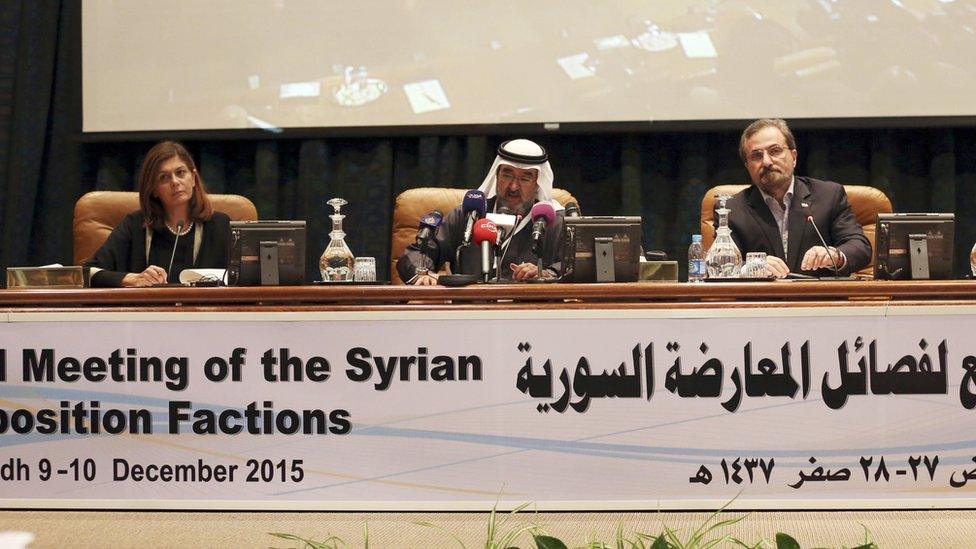
Syrian opposition factions agreed a common position on peace talks in Riyadh last month
Mr Assad is an Alawite, an offshoot of the Shia branch of Islam, but more importantly he is an ally of Saudi Arabia's arch-rival, Iran. So the Saudis have spent untold millions of dollars in backing various rebel factions in Syria with no tangible results.
Their critics say Saudi cash and weapons have ended up in the hands of hardcore jihadists, including al-Qaeda or even so-called Islamic State; the Saudis deny this.
In December, they hosted a largely successful conference in Riyadh to try to persuade many of Syria's political opposition and rebel factions to agree a common negotiating position for talks that could lead to a transitional administration replacing President Assad in the coming months.
But Russia's recent entry into the Syrian war has so altered the balance of power against the rebels that it is now questionable if either Mr Assad or his Russian and Iranian backers would be prepared to sign up to his departure.
As part of King Salman's newly assertive foreign policy, Riyadh has announced it may be planning to dispatch its own special forces into the Syrian arena. It would be an extraordinary development if they did.
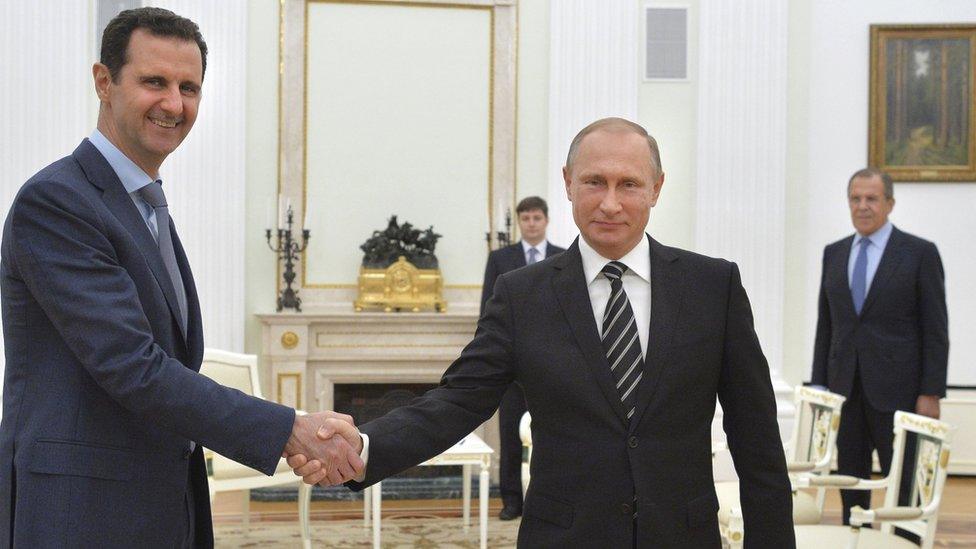
Russia's air campaign in Syria has bolstered Syrian President Bashar al-Assad
Whereas the Emiratis have amassed significant combat experience in expeditionary warfare in Kosovo and Afghanistan, the Saudi military has rarely ventured beyond its own borders and its performances in the Gulf War of 1991, and in Yemen in 2009 and over the past nine months, have been decidedly mixed.
But Mr Lacey defends the king's foreign policy: "For years, the West has been calling on Saudi Arabia to show more leadership in the neighbourhood.
"Now that Salman has done precisely that, both his critics and his enemies are expressing their misgivings. But, as his foreign minister recently asked, who else is willing to lead?"
Iran feud
Iran and Saudi Arabia are locked in a strategic duel for power and influence across the Middle East and under King Salman relations have reached a new low.
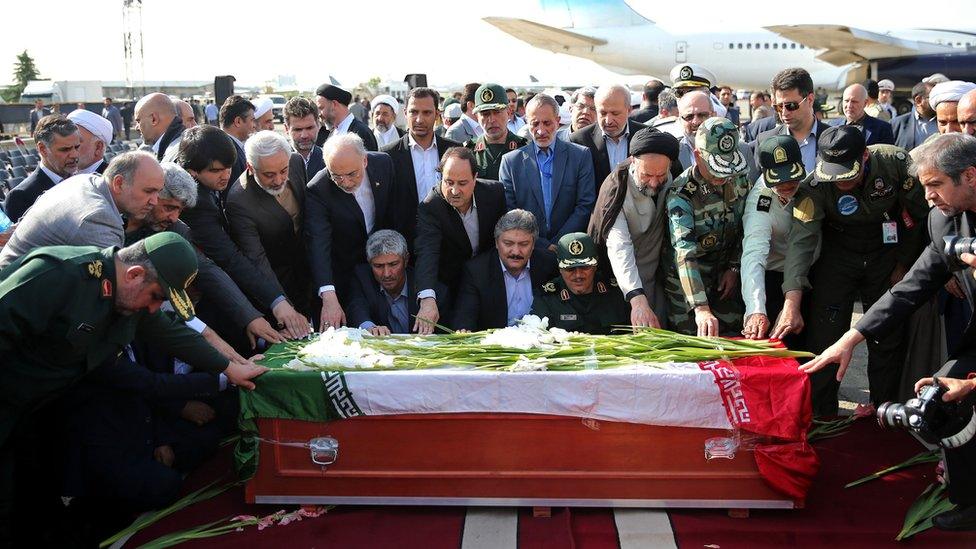
Tehran blamed the deadly Hajj stampede on Saudi "mismanagement"
The two countries each back opposing adversaries in Syria and Yemen, while Saudi Arabia suspects Iran of stirring up unrest amongst its own Shia minority in Eastern Province and in its neighbour, Bahrain.
In turn, Iran accuses Saudi Arabia, with its official Wahhabi interpretation of Islam, of helping to foster IS and its rigid ideology of intolerance.
After a reported 2,177 people were crushed to death in a stampede at the Hajj pilgrimage in Mecca in September, Iran said more than 400 of those killed were Iranians and it accused the Saudis of gross mismanagement.
Iran's supporters spread rumours (which turned out to be untrue) that the stampede was caused by a motorcade of Saudi princes.
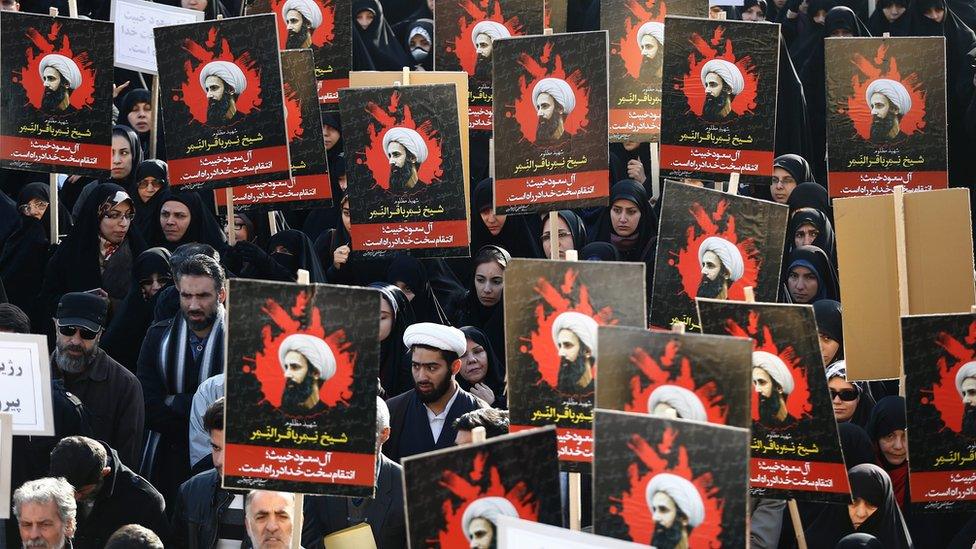
The execution of a prominent Shia cleric, Nimr al-Nimr, angered Iran
Then came the mass executions in Saudi Arabia on 2 January.
The beheading of Nimr al-Nimr, a firebrand Shia cleric convicted of "disobedience to the ruler", triggered calls for divine vengeance by Iranian hardliners. A mob also ransacked the Saudi embassy in Tehran, something most commentators believe could only have happened with a nod from the Iranian authorities.
Saudi Arabia immediately broke off all diplomatic, trade and travel ties with Iran. Several of its Arab allies also downgraded their links with Tehran in support.
Writing in the Dubai-based newspaper Gulf News, Dr Abdulkhaleq Abdulla, chairman of the Arab Council for Social Sciences, wrote: "No one can deliver tit-for-tat better to hardliners in Tehran than a hardliner team in Riyadh. Ultimately, the aim of the new Saudi assertive approach is to check Iran's relentless interferences in Arab affairs."
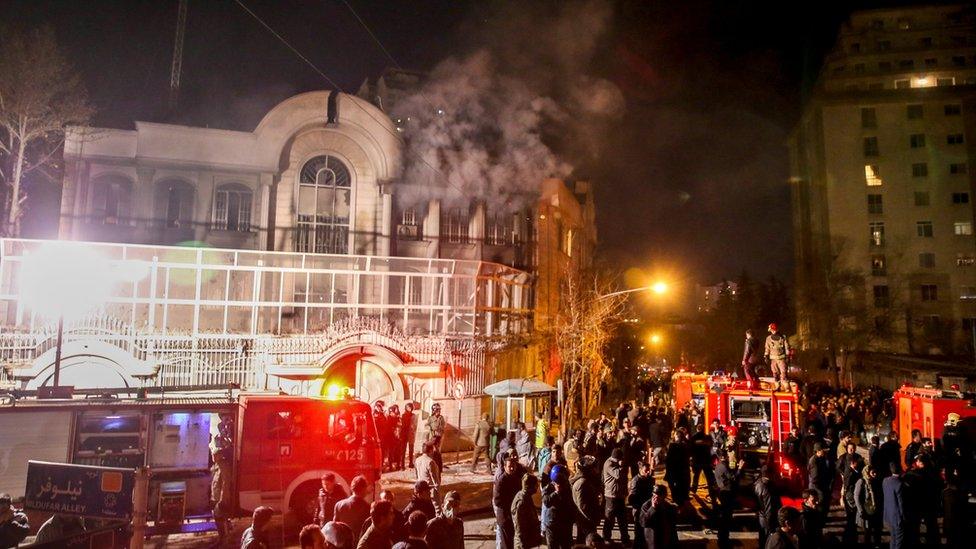
The ransacking of the Saudi embassy in Iran led the kingdom to sever diplomatic relations
This week, Saudi Foreign Minister Adel al-Jubeir again expressed fears that, in the wake of the Iran nuclear deal, Tehran would divert much of its newly unfrozen billions of dollars to funding its proxy militias around the Middle East.
Iran's latest budget allows for a 15%-plus increase in funds for the Islamic Revolution Guards Corps (IRGC), which has a secretive Quds Force that is responsible for overseas operations.
There are fears on the Arabian side of the Gulf that money badly needed for revitalising Iran's sanctions-hobbled economy will instead end up in the hands of Lebanon's Hezbollah movement, Yemen's Houthis and Iraq's Shia militias.
Oil price war
Even Saudi Arabia's friends believe it is playing with fire when it comes to maintaining high oil production and low prices.
The Saudis are lucky enough to be able to get oil out of the ground at incredibly low prices, so they are one of the very few countries to still turn a reasonable profit when oil sinks to below $30 a barrel. The same cannot be said for Iran, Russia and the US shale producers.
The Saudi strategy has been to keep pumping to increase market share and weaken their competitors, or even drive them out of business altogether.
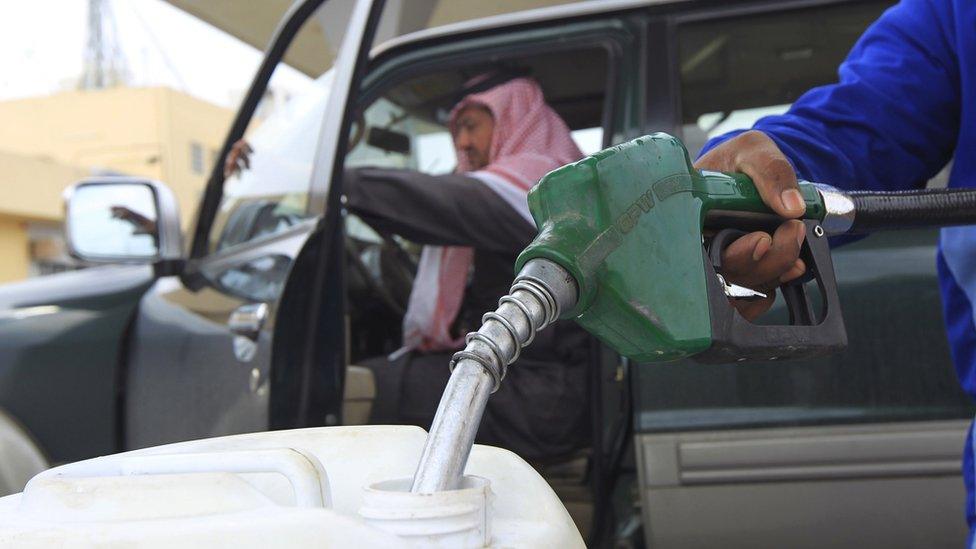
Saudi Arabia's income from oil fell by 23% last year
But the historically low oil prices are wreaking havoc on both the world economy and on the Saudi state budget, which is still heavily dependent on income from oil and gas.
The combination of a costly war in Yemen and a drop in oil prices from more than $100 a barrel to $30 has already depleted the Saudi state coffers by more than $100bn.
Prince Mohammed bin Salman's answer is to open up the economy and propose selling off state assets, such as a partial stake in the state-owned oil company, Saudi Aramco.
While economists have welcomed any move to liberalise the economy the Saud family know this can only be a temporary measure.
The more fundamental problem they face is that with an overwhelmingly young population spilling on to the job market there are simply not enough jobs to go round.
And if the state can no longer afford to pay hefty subsidies to cushion the Saudi population, the day will surely come when that population will demand more political freedom, an accountable government and a transparent budget.
Security v freedom
Almost 10 years after Saudi Arabia effectively defeated an al-Qaeda insurgency within its borders, a feat credited to the Crown Prince, Mohammed Bin Nayef, jihadist terrorism is back.
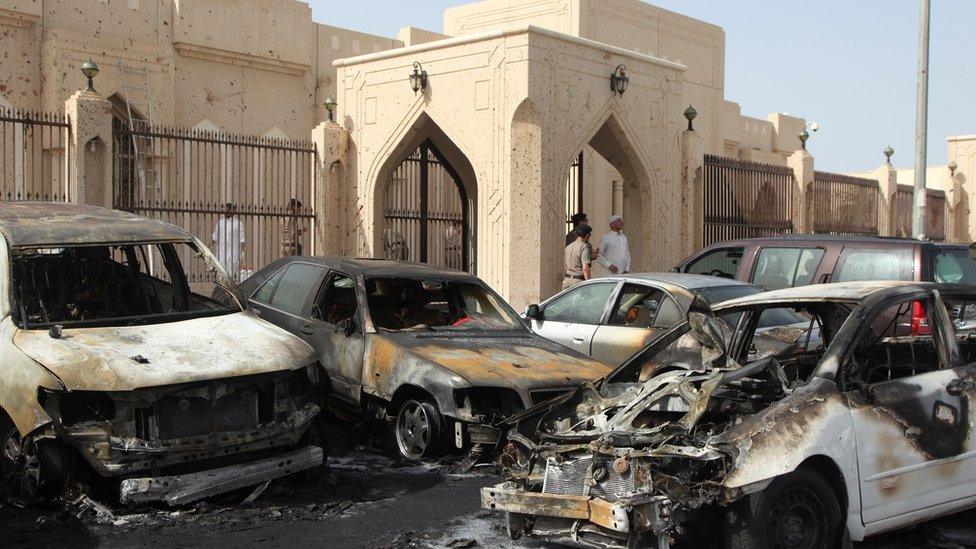
Jihadist militants affiliated to Islamic State have bombed Shia mosques in the kingdom
The past 12 months saw a series of horrific bombings in mosques, all claimed by IS, which has vowed to overthrow the Saud family and has declared a "province" in Saudi Arabia.
The group has primarily targeted Shia, whom it sees as heretics, in an attempt to provoke a sectarian backlash, as it has also sought to do in Iraq.
But Saudi security forces have also been targeted in the remote south-west of the country, and there have been frequent announcements of mass arrests of IS supporters accused of terrorism.
Unfortunately the Saudi authorities, who have never been able to tolerate criticism, have a habit of conflating terrorism with peaceful calls for reform, locking up bloggers and human rights activists as well as violent-minded jihadists.
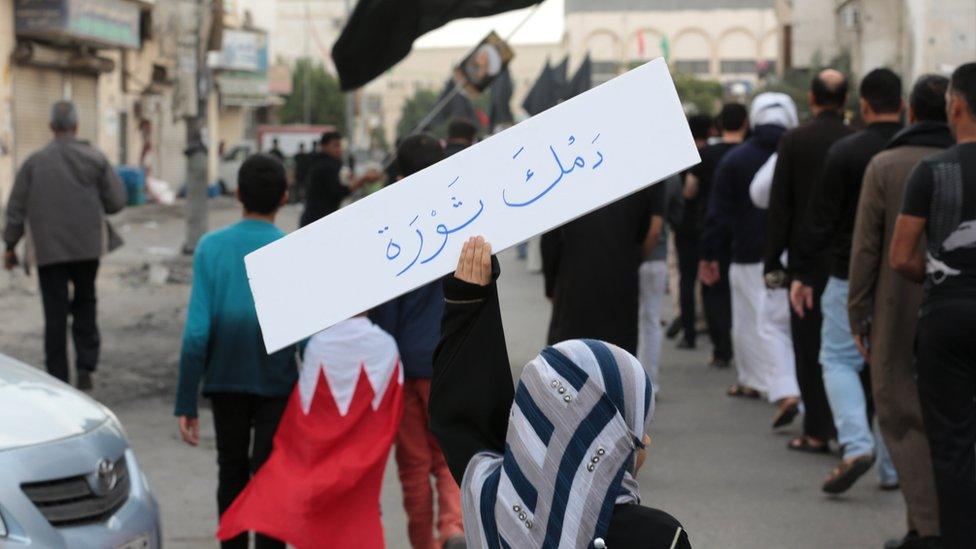
Protests by Saudi Arabia's Shia minority have continued despite a continuing crackdown
International human rights organisations, already critical of Saudi Arabia's record under the previous king, say repressive laws are being used to round up dissidents, and that Saudi executioners have also beheaded more people in the past year than since 1995.
"Whatever hopes there may have been for human rights reform under King Salman have been completely dashed amid an intensified crackdown," says Amnesty International UK's head of policy and government affairs, Allan Hogarth.
Succession question
There have been numerous reports in the Western media that King Salman suffers from Alzheimer's disease.
When I met him in late 2013 he showed no evidence of mental frailty, although he did need a walking stick to help him stand up.
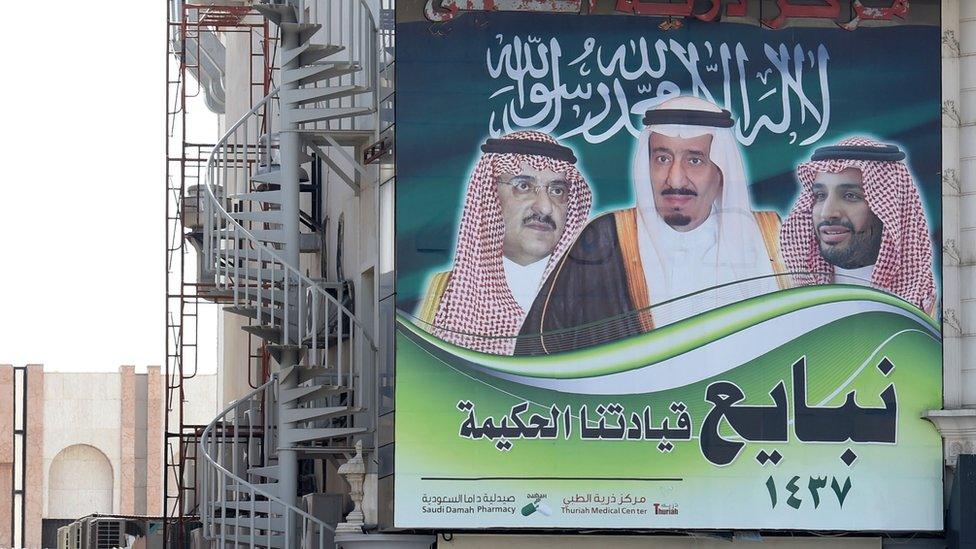
Prince Mohammed bin Nayef (left) is next in line to the throne
Currently, the succession is due to hand the throne to the Crown Prince, 56-year old Mohammed bin Nayef, who is also interior minister.
Many Saudis question whether this experienced and trusted minister would be prepared, as king, to retain the young and controversial Prince Mohammed Bin Salman as next in line to the throne.
Various journalists and commentators have long predicted the imminent fall of the House of Saud and been proved wrong. But whoever becomes the next king of Saudi Arabia is likely to face some of the most challenging years in this nation's short history.